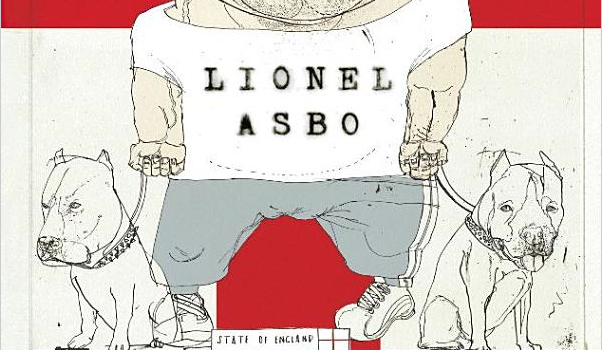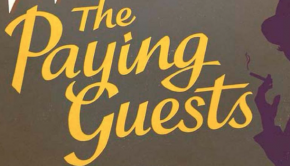Lionel Asbo by Martin Amis
| Press reviews | Buy the book | Have your say |
Blurb: Lionel Asbo – a very violent but not very successful young criminal – is going about his morning duties in a London prison when he learns that he has just won £139,999,999.50 on the National Lottery. This is not necessarily good news for his ward and nephew, the orphaned Des Pepperdine, who still has reason to fear his uncle’s implacable vengeance. (Jonathan Cape, 2012)
Matthew Adams, Literary Review
“The exaggeration here is wondrous, aggressive, hyper-Dickensian – and deliberately so. This is worth stressing, partly because it is central to Amis’s peculiar power as a novelist. Amis calls into being a world of exaggerations and distortions, and through that process makes the real world seem more like itself … It is this presence of feeling, this explicit attention to sentiment, that – even in an ostensibly savage novel such as this (which probably has most in common with the underrated Yellow Dog) – is coming to define late Amis. It is a formidable thing, to fuse deep emotion with violent humour (and this novel is extremely funny) in a prose style that no contemporary is capable of matching.”
Nicola Barker, The Observer
“Is this an offensive book? Hell, yes. Deeply. But then maybe modern England needs offending. Is this a readable book? It’s a Big Mac made from filet mignon. Is it a clever book? Clever and ignorant and topical and sad and cruel and ridiculous and breathtaking. It is a book of lovehate. It is a powershake. And the biggest joy is that Amis seems to find himself (and finds us, by extension) loving the thing he loathes. It is a great big confidence trick of a novel – an attack that turns into an embrace – a book that looks at us, laughs at us, looks at us harder, closer, and laughs at us harder and still more savagely. ”
Carole Midgley, The Times
“After the slating he got from some for Yellow Dog, this has been hailed by publishing insiders as a return to form. It certainly has much of the dazzling prose that made his earlier works so stand-out. As ever he makes the dreadful funny, the grotesque poetic. But there’s something else, a tenderness and humanity that may stem from age and his status not just as a father but now a grandfather. Few write about babies as movingly as Amis.”
Aidan Smith, The Scotsman
“Amis is sometimes accused of making fun of the lower orders, but here, often brilliantly, the jokes are on those who exploit the Lionels of this world when they suddenly come into money or notoriety: the press, the media middle-men, the hangers-on, the morally outraged, the TV creatives who dream up shows like I’m A Superstar, What the F*** Am I Doing Here? And don’t forget you and me – well, actually, you: for being in thrall to the tiny, manufactured dramas of D-list (and invariably double D-cup) celebs and buying all those daft magazines which perpetuate the rivalries and spats.”
David Sexton, London’s Evening Standard
“This is a verbally inventive comedy that has about as much connection with real life as P G Wodehouse’s Eggs, Beans and Crumpets in the Drones Club. Or to put it another way, it’s to be enjoyed in the same spirit as Little Britain (Lionel Asbo could be Vicky Pollard’s fearsome older brother). So no v-sign to England, after all. Amis himself, it seems, felt that while writing the book he wasn’t anxious enough about it, compared to his previous novels. But he never should have worried. It’s a hoot.”
Theo Tait, The Guardian
“It’s a familiar line of attack – against unearned wealth and celebrity, vulgarity, fake tits, feckless chavs, slipping educational and moral standards. But, this being a Martin Amis novel, everything has to be much weirder than that. He seems very remote from the world he describes … The stranger Lionel Asbo gets, the less it seems like a convincing indictment of England today – and the more it seems that Amis should have a nice lie down in a darkened room. But there are plenty of consolations: the poetic fragments (the “white-van sky of London”); the passing scraps of the saner novels Amis might have written. And not just these. In general, Amis only gets really interested in one character per novel (usually the Amis surrogate). This time, it’s Lionel …. you come to believe him, to be slightly scared of him, even to sympathise with his predicament. ”
Kathryn Harrison, The New York Times
“Whereas the grotesqueries of Money accrue the weight of tragedy, Lionel Asbo does not. Under its sordid costume, it’s a simpler and far less troubling book, probably because John Self is a fully realized character while Lionel remains a caricature.”
Philip Hensher, The Spectator
“Lionel Asbo is a professional piece of work, verging on the expert — the detail of the plot, the characters’ crimes and ambitions and desires come together in a satisfying way. But it falls some way short of Amis’s best work, and, though it ought to be read is not essential Amis in the way that Money, Experience and The Pregnant Widow are … The lottery, as I said, is a weak central device, because one has gone over it so often oneself. Lionel’s malice is entertainingly handled, and works itself out in pleasingly horrible ways. But as a character he is not illuminatingly done. It is a sign of laziness when his appearance is compared to Wayne Rooney’s. ”
Tim Martin, The Daily Telegraph
“In previous books, the demands of this tumultuous, self-congratulating prose have forced Amis either to develop a narrator who can plausibly contain it (a huge success in Money; less so in House of Meetings), or use the Nabokovian device of couching the whole story in a third party’s account. Lionel Asbo employs no such technique, which makes identifying the source of its satire a slippery affair … It doesn’t help that as sociopolitical commentary, Lionel Asbo feels helplessly off course and out of date. Most of its main targets — pitbulls, hoodies, chavs, Jordan, lotto louts, I’m A Celebrity — feel about a decade old.”
Jonathan Barnes, Times Literary Supplement
“Lionel Asbo is a minor work, though one not without magnesium flares of brilliance. Where are these to be found? Not, we may be sure, in the realm of story for in Lionel Asbo, as in much of the Amis oeuvre, the narrative unfolds in an almost lackadaisical manner, its convulsions desultory, its moments of surprise or high drama thrown away. Nor are the characters singular: Lionel squats in a line of descent from such monstrous slobs as Clint Smoker ( Yellow Dog), Keith Talent ( London Fields) and John Self ( Money), while Threnody is a scheming beauty who would find much in common with the femmes fatales – Nicola Six, Selina Street – who glide sharkishly through the pages of those narratives. It may be no surprise, then, to learn that the new novel’s most successful elements occur strictly on the level of the individual sentence.”
Leo Robson, The New Statesman
“Amis’s version of Dickens’s work – what it stands for, what it amounts to, the possibilities it flourishes – is narrow, to say the least, and so when he composes a more or less straight piece of updated Dickens pastiche, as he has done in Lionel Asbo: State of England, it is best to lower, or narrow, your expectations … It is tempting to see the London of Lionel Asbo less as a caricature of the declinist viewpoint than as a straightforward presentation of how things look to a physically vulnerable, surrealistically well-spoken family man who spends more time reading Saul Bellow and conservative newspapers than walking the streets – the “moronic inferno”, not as nightmare, but as reality.”
DJ Taylor, The Independent
“Money, Amis’s undisputed masterpiece from 1984, had some immensely prescient things to say, or imply, about nascent celebrity-cum-tabloid culture and its effects on individual and collective intelligence. This is Lionel Asbo‘s theme, 28 years later. Yet the materials and the approach – necessarily, Amis would argue – are a whole lot cruder … None of this would matter quite so much, perhaps, if the novel weren’t so obviously located in an England that reveals itself to be a fair bit older than the one it affects to describe, rife with glimpses of teenagers taking their “O levels” (an exam abolished in 1988), sitting their 11-Plus (an impossibility in “Diston”) and knocking up “four distinctions” in their A Levels.”
Amanda Craig, The Independent on Sunday
“A satirical novel needs archetypes, not clichés: Becky Sharp is real to us in a way that Lionel, the Keiths and John Self never are – perhaps because, as readers, we are on her side. The “lotto lout” is just the kind of subject that would enthral any heir to Hogarth, yet for bitter wit to bite, it needs pathos. Once again, the delight of re-encountering Amis’s mordant prose falls away after an initial dazzling burst of promise.”
Christopher Bray, The Daily Express
“You have to love outlandish metaphors to love Amis so if you can’t hear the “sneeze” of a beer can ring-pull, can’t visualise prison “brickwork the colour of beef tea”, can’t laugh at (even as you loathe) “the rough spud of Lionel’s face”, you might want to steer clear. Then you might want to anyway. For all its brio and energy this novel doesn’t add up to much.”
Lionel Shriver, The Financial Times
“Amis’s premise has possibilities – but execution is all, innit? This novel’s first third or so is a pleasure. Yet once Lionel the “Lotto Lout” starts frittering his millions, becoming first the butt, then the darling, of the tabloids, the book flatlines. Off the top of one’s head, on what would an uncultured ineducate lavish a sudden and undeserved packet? Hotels, booze and clothes. Models, motors and mansions. And that’s just what Asbo buys. No surprises … Worst of all, for its whole last half this novel just isn’t funny.”
Adam Mars-Jones, The London Review of Books
“Of course Lionel Asbo is overwritten – it’s by Martin Amis! The problem is that it’s under-overwritten. And there it is, the voice in a generation’s ear, charming without charm, insistently dazzling, milking the paradoxes until their teats are sore and they have no more nourishment to give. It’s easy to write Amislike sentences, hard to write good ones, and there are signs that Amis feels this too.”
Michiko Kakutami, The New York Times
“Although Asbo is a more engaging book than Mr. Amis’s tedious last novel, The Pregnant Widow, it’s nonetheless a listless performance, especially next to similarly themed works like Money, Success and London Fields. The sendups of Lionel’s bad taste — guzzling Champagne out of a beer mug or reading a trashy newspaper in an elegant restaurant — are predictable and uninspired, and so are the descriptions of Threnody’s attempts to manipulate the press, going on a morale-boosting mission to visit the troops in Afghanistan or trying to get Lionel to start a line of clothing. The novel’s fizzy language is an improvement over that employed in Widow, but it too lacks the kinetic energy and raw, edgy poetry of Mr. Amis’s finest work … It reads less like a big “state of England” novel than a smallish postcard mailed from there some years ago.”
Ron Charles, The Washington Post
“As Amis’s class mockery curdles, we’re left with a misanthropic vision of human suffering compounded by venality and lust … The problem is really one of initiative, even effort. In Super Sad True Love Story, you could smell Gary Shteyngart sweat as he labored to keep his outrageous satire one step ahead of dismal current events. Here, Amis seems unwilling to exert more effort than it would take to change the channel from Jersey Shore to Half Pint Brawlers. He’s ambling years behind The Situation and the Kardashians, serving up blanched stereotypes on the silver platter of his prose as though it contained enough spice to entertain or even shock. ”
Sam Sacks, The Wall Street Journal
“The book is not especially current and, despite an incest story line, it’s not as lurid as the author seems to want it to be. It suggests the novelization of a Farrelly-brothers comedy, except with less plot and no good jokes.”
Peter Kemp, The Sunday Times
“Wildly remote from realism — at one point Lionel’s crude antics in a West End restaurant provoke “raised lorgnettes” — the would-be satire never achieves any purchase. And the retaliatory outrage stoking it backfires uncomfortably. What Amis most deplores about the “rich and famous” celebrity-trash he parades is that “none of them got that way by work of the mind”. But this novel, his latest work of the mind, hardly constitutes compelling support for this indignation. The verbal dazzle exhilaratingly evident in his best book, Money (1984), has by now dimmed into near nonexistence. Devoid of it, his fiction’s shortcomings stand out starkly. Melodrama (“Death was awake, death was going about its business”) substitutes for menace; mawkishness (especially in the portrayal of Des’s angelic baby girl) fills in for warmth.”
OMNISCORE:












